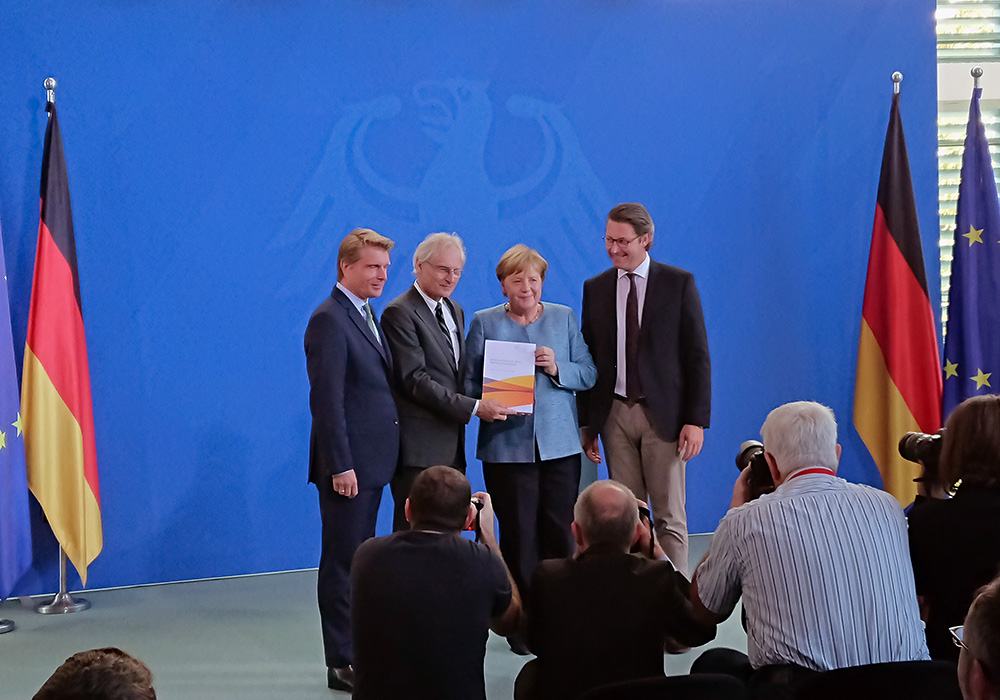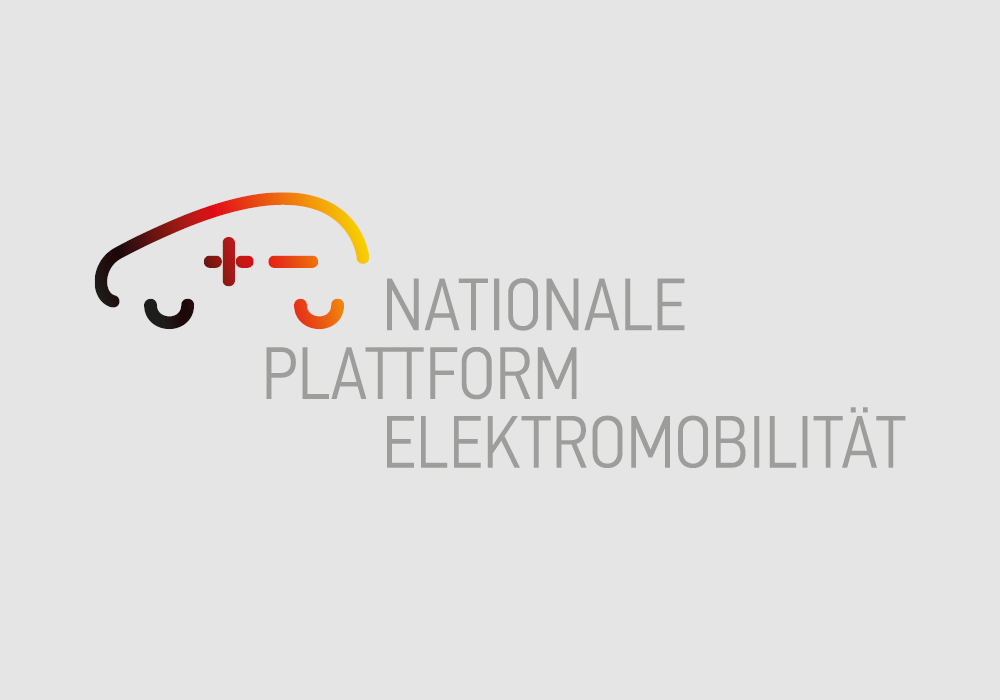German National Platform for Electric Mobility presents Progress Report 2018 to German Chancellor

Berlin, 19 September 2018
Today, the German National Platform for Electric Mobility (NPE) presented its Progress Report 2018 to German Chancellor Angela Merkel. The NPE’s report concludes that Germany is a leading global supplier in the field of electric mobility. Germany is also closing the gap on the world’s leading markets, and experienced the strongest growth in cumulative vehicle registrations of any country in the world in 2017. According to the latest forecasts by the NPE’s experts, the target of one million electric vehicles on Germany’s roads will be met in 2022.
Germany is closing the gap on the world’s leading electric mobility markets in the Netherlands, France, Norway, the US, the UK and China. The cumulative total of new electric vehicle registrations in Germany had reached approximately 131,000 by the end of 2017, and over 177,000 by 31 August 2018. In 2017, Germany achieved the highest growth rate in the world (+117 percent) and, together with China, it also has the widest choice of commercially available electric vehicles. 33 models made by German manufacturers are now available on the market. Moreover, this growth is set to continue: according to the latest forecasts by the NPE’s experts, Germany will reach the milestone of one million electric vehicles in 2022 – two years later than originally planned. Presenting the report, NPE Chair Henning Kagermann made the following observations: “The market evolution and high growth rates in Germany are very positive and demonstrate that we have achieved significant progress. The target of one million vehicles remains a useful benchmark figure for policymakers. However, rather than focusing on the exact number, it is more important to win over consumers by providing an integrated overall system that includes attractive vehicles, a charging infrastructure capable of meeting demand, a climate-friendly energy system, user-oriented services and an appropriate regulatory framework. It is this that will ultimately ensure widespread take-up of electric mobility.”
Germany is a leading global supplier in the field of electric mobility
Germany’s automotive manufacturers are achieving a higher or at least similar market share for their electric vehicles compared to their conventional vehicles in the key automotive markets. Their market share in Western Europe is 53 percent, while their 16 percent market share in the US is double the figure for conventional vehicles. The exception is the Chinese market, where the proportion of German electric vehicles is significantly lower due to state regulations promoting electric vehicle production by Chinese companies. According to Bernhard Mattes, President of the German Association of the Automotive Industry (VDA), “The German automotive industry is a leading innovator in the field of electric mobility. Globally, one third of patents in this field come from Germany. Over the next three to four years, our companies will invest around €40 billion in R&D for alternative, mainly electric drive technologies. There will be three times as many commercially available models by 2020. These developments are supported by public investment – the Federal Government provided €2.2 billion for R&D in the field of electric mobility up to September 2017.”
Significant progress on the expansion of the charging infrastructure
The coverage provided by Germany’s charging network is getting better and better. A provisional estimate by the NPE’s experts put the number of charging points (i.e. charging cable sockets) in Germany in December 2017 at around 12,500, including more than 850 fast charging points with charging powers of over 22 kW. A Federal Government funding programme will provide the basis for further expansion of the charging infrastructure. If all the applications received for funding are fully realised, it will be possible to triple the number of standard charging points and achieve a tenfold increase in the number of fast charging points by the end of 2018. This year, Germany will also become the first country in the world to complete a nationwide motorway charging network comprising more than 400 locations, each with multiple fast charging points. Moreover, we are already beginning to see the first fast charging stations offering higher charging powers of up to 350 kW. This dramatically reduces charging times compared to today’s standard fast charging points. In addition, the Charging Station Ordinance has improved user access to charging stations. Since 2017, all new charging points in Germany must at the very least be fitted with the Combined Charging System (CCS) as standard. They must also provide ““barrier-free” access, i.e. without any prior contractual commitment. This means that the plethora of different connector types and incompatible charging points are a thing of the past – CCS is now established in Europe, the US and other key automotive markets.
Outlook up to 2025
Global demand for electric vehicles will continue to grow exponentially, and German manufacturers will continue to grow their share of the total global market. German manufacturers alone will have 100 electric vehicle models on the market by 2020. According to current projections, cumulative new vehicle registrations in Germany will reach 2 to 3 million by 2025, accounting for between 4 and 6.5 percent of the entire market. This figure will rise to between 10 and 15 percent by 2030.
The net employment effect will remain positive over the next few years, and the NPE’s experts expect this positive employment impact to continue until 2025 across the system as a whole. However, the pressure on employment will increase after this date, especially in powertrain production. “In order to prevent negative employment effects, it will be necessary to invest in leading-edge technologies and infrastructure a soon as possible. We call on the Federal Government and the private sector to take concrete action to address the relevant requirements in terms of charging infrastructure, power grids, storage technologies and raw materials. It is particularly important that these measures should be supported by employment and HR policies that are fit for the future, since training and professional development will be key to a successful transformation”, says Jörg Hofmann, First Chairman of IG Metall.
As the global market continues to grow, there will be an increasing focus on raw materials and their availability. Recycling and second use solutions are becoming important topics for the future. According to Dieter Kempf, President of the Federation of German Industries (BDI), “Electric mobility is one of the 21st century’s key technologies. Government and industry must work together to secure the supply of raw materials that are critical to battery cell production, such as cobalt, lithium and graphite. In view of the Chinese presence in the countries where the raw materials are mined, raw material availability is set to become a critical factor for the competitiveness of the German and European electric mobility industries. In order to ensure a successful market ramp-up, German industry is working hard to extend electric vehicles’ range by increasing the energy density of traction batteries while at the same time reducing their weight and cost. R&D priorities across the entire value chain include life cycle assessments, materials, functional integration, high power charging, material, cell and battery technology and battery production. Government must support R&D through systematic funding.”
In order to power one million electric vehicles, it will be necessary to install 70,000 public standard (AC) charging points and 7,100 public fast (DC) charging points, as well as approximately one million private charging points. The NPE’s market ramp-up scenario projects that approximately 130,000 to 190,000 public standard charging points and 13,000 to 19,000 public fast charging points will be required by 2025. New innovation networks and partnerships have emerged to address challenges such as the expansion of the public charging infrastructure. One example is the joint initiative of Daimler, BMW, Ford and the VW Group to install a European fast charging network with 400 fast charging stations by 2020. Urgent action is required to expand the private charging infrastructure – it will be necessary to install between 2.4 and 3.5 million private charging points by 2025. The relevant amendments must be made to Germany’s tenancy and residential property law in order to facilitate their installation.
The existing power grid can cope with current levels of demand for electric vehicle charging. However, continued market growth will result in more demanding power distribution requirements that will call for local power grid expansion and smart load management. By 2025, electric vehicles will have become an important influence on the energy market.
The full “Progress Report 2018 – Market ramp-up phase” is available on the website of the German National Platform for Electric Mobility.
About the German National Platform for Electric Mobility
The German National Platform for Electric Mobility (NPE) coordinates the development of electric mobility in Germany. Acting as an advisory body to the Federal Government, it facilitates a strategic dialogue that brings together 150 representatives from industry, science, government, the trade unions and trade associations. Its members collectively investigate the economic, social and environmental potential of electric mobility and formulate recommendations for government and industry.



